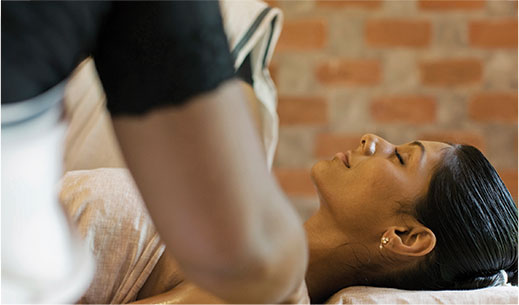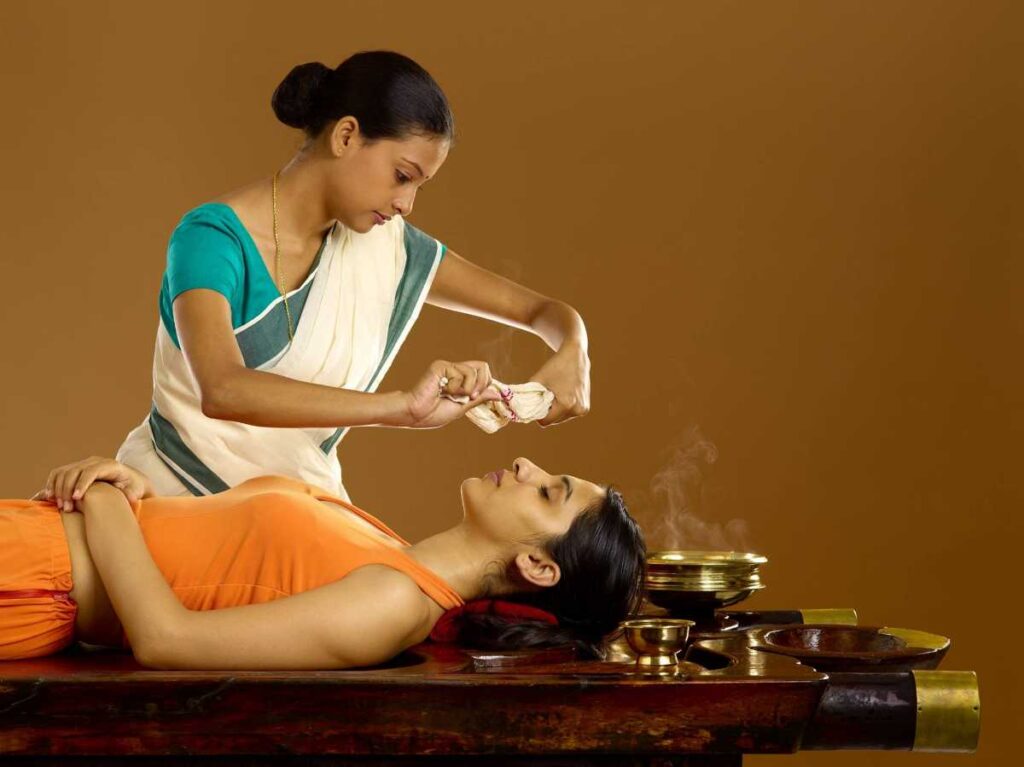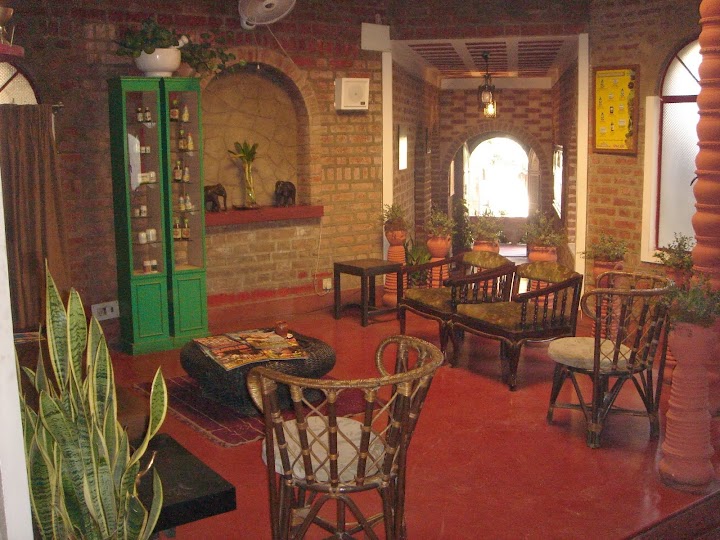Ayurveda is the best nature-based science to relax, revive, rejuvenate and treat the body, mind & soul. Kairali assures the most authentic Ayurvedic treatments by manufacturing their own products and in-house training for the staff. Kairali Centres offer varied services that include Ayurvedic treatments and therapies, consultation with skilled doctors, affordable and effective ayurvedic packages, and ayurvedic training for all those who want to gain an in-depth knowledge of Ayurveda or desire to become a skilled ayurvedic practitioner or therapist. Kairali’s own line of Ayurvedic medicines and products are available at all its treatment centres. Founded in 1989, “Kairali Ayurvedic Centre” has over 33 years of experience. Using the ancient science of Ayurveda as its only means, Kairali has established itself as the pioneer in Ayurvedic Treatment Centres by setting its first Centre in New Delhi and never looking back.

Kairali’s Signature treatments for Weight Loss, Pain Management, Stress Management and Membership like Privileged Membership, Wellness Packages & Royal Makeover are the most sought-after treatments and would be the best way to be introduced to Authentic Ayurveda.
Abishek K Ramesh, Executive Director, Kairali Ayurvedic Group, shares more details with us in this interview.

How do you see the situation panning out for the Ayurvedic Wellness Sector in 2022?
Ayurvedic Wellness Sector has the potential to be the most important driver of the Indian Wellness industry’s growth. Wellness tourism and Ayurvedic Wellness Sector, which rejuvenates the body, mind, and spirit via detoxification given by different healthcare therapies, becomes even more crucial in a continually developing economy where the population is recuperating from a pandemic hit and individuals are confronting a rapidly changing existence. With its ancient practices of Ayurveda, yoga, meditation, acupuncture, naturopathy, panchakarma, and holistic health, India is regarded as one of the genuine spiritual homes of the current wellness movement internationally. Ayurveda is always beneficial, and it stood true even during the Covid-19 pandemic. The complete lifestyle that is recommended in Ayurveda revives the person. With panchakarma therapy, Ayurveda aids in cleansing as well as regeneration. Life has grown extremely stressful in recent years, causing physical and mental distress. Ayurveda and Yoga are the key to helping the body, mind, and spirit, as well as strengthening immunity. These treatments not only serve to cure the sick, but they also aid to immunise fit and healthy people.

What is the USP of Kairali Centre?
We, at Kairali Ayurvedic Centre, are not trying to remove the ailment; but we look to strengthen the body to its optimum level which in turn takes care of the ailment and eradicates any underlying issues. Kairali only treats root causes after analysing the Prakriti and advises on Ayurvedic Diet as well. We have helped 15.3 lakhs individuals to improve their health and reverse many chronic ailments by treating with Ayurveda Therapies with a satisfaction rate of over 93%. Based on ancient and proven Ayurvedic therapies, Kairali Ayurvedic Group has been promoting and establishing Ayurvedic Treatment Centres, Ayurvedic Hospitals, Wellness Centres, Ayurvedic Spa and Ayurvedic Wellness Resorts in India and overseas for the last 33 years with a vision – “To be known as synonym of True Ayurveda across the globe.”

What are your thoughts on sustainable health?
People are increasingly focused on preventative strategies to eliminate or postpone the early beginnings of chronic illnesses as the trend shifts toward sustainable health. There is no one-size-fits-all therapeutic approach at Kairali Ayurvedic Centre. There will be a tailored treatment plan for each ailment based on each individual’s doshas. According to this ancient study, implementing dosha-specific treatment strategies can contribute to an individual’s overall balance and well-being.
What does the post-pandemic scenario look like?
Ayurveda has long been seen as a preventative system that focuses on daily and seasonal regimens or routines that aid in the maintenance of our health. The necessity of having a robust immune system during these difficult times, as well as the Government of India and the Ayush Ministry emphasising the value of Ayurveda and home cures, has led to a resurgence of trust in Ayurveda among the general public. It has been observed that people who seek Ayurvedic treatments do so with the expectation of improving their entire health. Following the Covid-19 outbreak, there has been an increase in demand for Ayurvedic Treatment, as people have realised the relevance of traditional immune boosters. Experts predict that increasing demand for Ayurvedic goods, along with rising discretionary expenditure, will propel Ayurveda to a $15 billion sector by 2023.
How did Covid-19 impact the Ayurvedic wellness industry?
The COVID-19 epidemic has brought immunity, prevention, and health to the forefront. The fast-growing Ayurveda business in India has the potential to turn the country into a wellness hotspot. In this context, alternative medicine, particularly Ayurveda, has risen to prominence like never before. While Ayurveda has long been a popular medicinal technique in India, the industry is about to enter a period of rapid expansion.

What are the key challenges that lie ahead for you in the near future?
Ayurveda, India’s oldest medicinal system, has survived multiple waves of development over the previous 5000 years. Ayurveda is poised to become one of the most innovative healthcare growth markets in the world. The worldwide Ayurveda market is predicted to grow at a CAGR of 16.2 per cent to $9.7 billion by 2022. The sector in India is expected to triple in size from US$2.5 billion in 2015 to US$8.0 billion by 2022. Although the fledgling Ayurveda business is growing rapidly, the sector still faces problems that must be solved. The following are some of the industry’s biggest challenges:
Standardization: Validation of Ayurvedic concepts (using contemporary norms) will make Ayurveda more acceptable to society, allowing it to become a mainstream life science. Ayurveda is facing a dilemma in terms of branding and consistency, as well as a diverse variety of major and small merchants at the regional and national levels. Standardization and quality control are required to bring Ayurveda to a worldwide audience.
Purchasing raw ingredients: The procurement and development of raw materials must be enhanced to ensure that the quality and core techniques of Ayurveda are not compromised. Pesticides, herbicides, and insecticides are frequently considered as remedies to protect and boost productivity yet farming techniques have radically departed from age-old conventional methods.
Utilisation of Technology: In the present period of medical Ayurvedic practise, technology is playing a big part, and it’s opening a lot of doors for avoiding ‘overtreatment.’ It has improved the speed with which diagnoses are made and the effectiveness of treatment techniques. The lack of or sluggish adoption of technology may be a difficulty for Ayurveda, but it may also be a strength: using technology, goods and services can be made more widely available and accessible.






